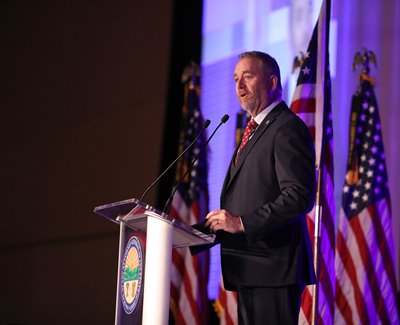
Morrow Police Officer Jeffrey Phegley was the kind of young man who’d start off his shift singing to co-workers.
On the day in 1987 when he was murdered, the 22-year-old also had visited his sick grandmother before coming to work, a shift he had volunteered to cover for the chief of the small department.
You see, stepping up was a way of life for Officer Phegley, who regularly volunteered with the Red Cross, a hospital and the local ski patrol. He had also volunteered on a presidential campaign and interned with a U.S. congressman, but his heart was in law enforcement.
He had a bright future dedicated to helping Ohioans, but Anthony Wayne McIntosh stole that promise.
On that cold day in January 1987, McIntosh had thrown back eight or nine beers. The 20-year-old had stashed a sawed-off shotgun in his car after swearing to a friend that he would kill the next officer who tried to stop him.
When Officer Phegley pulled over McIntosh for driving 48 mph in a school zone, the younger man fired the illegal weapon and fled.
Officer Phegley was not killed because of something he did or did not do. He died on the street — 150 shotgun pellets embedded in his chest and heart — simply because he was a police officer.
The young officer never got the chance to help another Morrow resident, sing another silly song for his co-workers or get married and pass to any children his dedication to make the world a better place. The effects of this crime will ripple through the generations until the end of time.
So it is essential that we remember who Officer Phegley was and what he stood for.
Likewise, we must remember Dayton Police Detective Jorge Del Rio, who was killed 32 years later, during a raid on drug traffickers this past November.
But there is something more we owe Phegley and Del Rio — ensuring that their killers receive a just punishment.
That is not just for the families of those fallen officers, who are forced to live with a hole ripped through their lives. It is for all of Ohio. Every time we lose an officer, we lose all of the future good he or she would have done.
Take Detective Del Rio as an example. The 55-year-old father of five — who once saved a teen from drowning and, another time, prevented a double murder for hire — specialized in undercover work that took drugs off the street and sent traffickers to prison.
When the man who killed Detective Del Rio fired his gun, he stole from the officer’s family and from each of us.
Yes, the killing of a police officer is an attack on you and your family, as well as me and my family. That is because the rule of law is the foundation of our society. Officers like Phegley and Del Rio step up to take on those who threaten us. As a result, law-abiding folks don’t have to; we can live in peace and security, free from violence and fear.
In exchange for police putting their lives on the line, we must do what we can to protect officers. Thus we arm them with guns and body armor, train them to fight criminals and provide them with other crime-fighting technology.
We support tough punishment for those who kill officers. A strong response serves as a deterrent and provides justice for, in essence, two crimes — the harm to the officer as a person and the harm society suffers when one of its guardians is killed.
That is why I commend the Ohio Parole Board for refusing to free Anthony Wayne McIntosh after a hearing in November, and why my heart goes out to Officer Phegley’s loved ones, who once more were forced to relive the worst tragedy of their lives.
I hope — for the sake of Detective Del Rio’s widow and daughters, for every officer in Ohio and the nation, and for the rest of us — that the men responsible for the Dayton officer’s death get the full measure of justice they deserve.
Yours,
Dave Yost
Ohio Attorney General